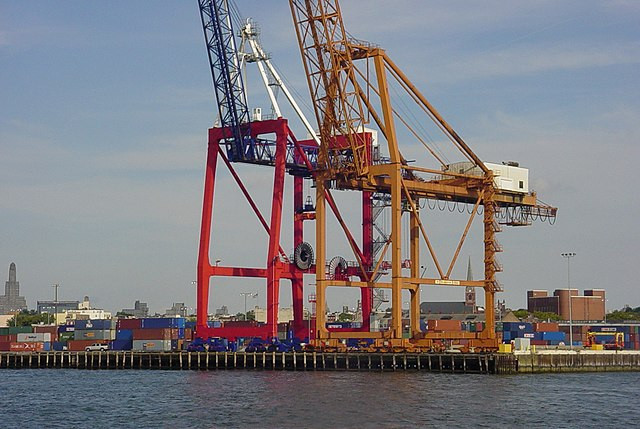In an unprecedented move, nearly 50,000 members of the International Longshoremen's Association (ILA) initiated a strike early Tuesday, shutting down ports from Maine to Texas and threatening to disrupt the flow of goods crucial to the U.S. economy. This work stoppage marks the first significant strike at East and Gulf Coast ports since 1977 and comes in the wake of protracted negotiations between the ILA and the United States Maritime Alliance (USMX) over wage increases and job security.
The strike, which commenced at midnight, halts operations at 14 major ports, including the Port of New York and New Jersey, the third-largest port in the nation by cargo volume. This shutdown encompasses a wide range of goods, from bananas and automobiles to crucial manufacturing components. The ILA's President Harold Daggett voiced the gravity of the situation, stating, "If we have to be out here a month or two months, this world will collapse."
At the heart of the dispute lies a stark divide between the union's demands and the maritime alliance's offer. The ILA is seeking a $5-per-hour pay increase annually over a six-year contract, culminating in a total compensation boost of 77%. Conversely, the USMX has proposed wage increases of nearly 50%. Daggett characterized the union's demands as reasonable given the shipping industry's record profits, which soared to over $400 billion from 2020 to 2023 due to pandemic-induced supply chain disruptions.
Economic analysts warn that this strike could have dire implications for the economy. Estimates suggest that a prolonged work stoppage may cost the U.S. economy nearly $3.8 billion per week and lead to rising prices for consumer goods. According to Wedbush Securities, any shipments rerouted to the West Coast would incur additional transit times and costs, potentially sending ripple effects through the supply chain that could last well into early next year.
With essential goods such as food and manufacturing parts affected, consumers may soon experience shortages and rising prices. The ILA represents workers handling significant volumes of perishable items, including cherries and various alcohol products. The American Farm Bureau estimates that 1.2 million metric tons of bananas pass through the affected ports, representing about a quarter of the nation's banana supply. The potential loss of fresh produce and other perishables could lead to higher prices at grocery stores as early as next week.
Retailers, aware of the potential disruptions, have rushed to stockpile goods for the upcoming holiday season. The ports are crucial for imports that typically arrive in bulk from August to October, and many retailers adjusted their schedules in anticipation of a labor dispute. However, while non-perishable goods might be sufficiently stocked, perishable items are more vulnerable to supply chain shocks.
Despite the critical nature of the situation, President Biden has refrained from intervening directly, emphasizing the importance of collective bargaining rights. A White House spokesperson stated that Biden and Vice President Kamala Harris are closely monitoring the situation, asserting that the administration believes in the negotiation process rather than unilateral government intervention. "The President has directed his team to convey his message directly to both sides that they need to be at the table and negotiating in good faith-fairly and quickly," the spokesperson noted.
The backdrop of this labor strife is compounded by increasing political pressures on the Biden administration, especially as Vice President Harris faces a tight election race. Calls for intervention have been echoed by the U.S. Chamber of Commerce, which urged Biden to utilize the Taft-Hartley Act to keep the ports operational. However, Biden's commitment to labor rights poses a dilemma; the act has historically been used to prevent strikes but risks undermining union solidarity.
Business leaders are expressing alarm over the potential fallout from the strike. Steve Hughes, CEO of HCS International, articulated a growing concern, stating, "The union is holding the entire country over a barrel," warning that the consequences of this standoff could be severe. Moreover, with nearly 100,000 containers currently waiting to be unloaded at ports like New York City, the implications for the supply chain could extend far beyond the immediate disruption.
As negotiations stall and both sides dig in, the striking dockworkers are prepared for a prolonged confrontation. Daggett asserted, "We are prepared to fight as long as necessary to stay out on strike for whatever period it takes to get the wages and protections against automation our ILA members deserve." The ILA's demands also include safeguards against increasing automation in ports, which members fear could lead to job losses. Daggett emphasized that without stronger contractual protections, the union will not return to the negotiating table.




